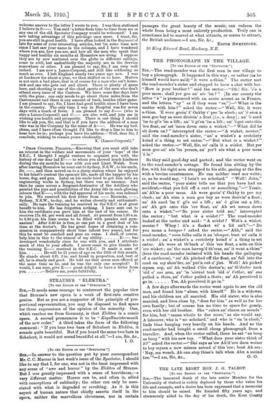THE PHONOGRAPH IN THE VILLAGE.
[TO THE EDITOR 07 THE "SPECTATOR."1
SID,—The road-mender was the first man in our village to buy a phonograph. It happened in this way ; or rather (as he himself would have said) "it were a-thisn." The rector met the road-mender's sister and stopped to have a chat with her. "How is your brother F" said the rector.—" Oh! Sir, 'e's a poor mess ; shall yer goo an' see 'im F" [In our county the letter " e " is pronounced with an acute accent as in France, and the letters " ay " as if they were " ee."]—" What is the
matter with him P" asked the rector.—" Well, Sir, it were
a-thisn. were gooin' t' Oakby t' pee 'is eloob ; an' 6 seen a
man goo boy as were droivin' a float [i.e., a dray] ; an' 6 axed
lin to gi'e a lift; an' 6 gi'en lin a lift ; an' 6 got onto this 'ere float, an' set 'issen down onto a wisket."—" What did he sit down on F" interrupted the rector.—" A wisket, mester,"
said the road-mender's sister, "an' a wisket's a crotchety koind o' a thing to set ontue."—" But what is a wisket ? " asked the rector.—" Well, Sir, we calls it a wisket. But yer mun goo an' see 'im yersen, an' yer'l see what a poor mess 'é is."
So they said good-day and parted ; and the rector went on to the road-mender's cottage. He found him sitting by the fire, with his right arm strapped to his side, gazing at the fire with a bovine countenance. He can neither read nor write ; or, as he would say, "I bain't no scholard." " Well ! John," said the rector, "your sister tells me that you have had an accident,—that you fell off a cart or something."—" Yeesir, an' Ah'm a poor mess. Ah were gooin' t' Oakby to pee my cloob ; an' Ah seen a man goo boy as were droivin' a float ; an' Ah axed 'fin t' gi'e me a lift ; an' é gi'en me a lift ; an' Ah got onto this 'ere float, an' Ah set mesen down onto a wisket."—" So your sister told me," interrupted
the rector ; "but what is a wisket ?" The road-mender looked at the rector and said : "A wisket ? Wot's a wisket.
mester ? Whop! it's a flasket wi' a lid on't."—" Do
you mean a hamper ? asked the rector.—" Alih," said the road-mender, "SOOIM folks calls it an 'ahmper, boot we calls it a wisket ; an' a wisket's a crotchety koind o' a thing to set ontue. Ah were at th'back o' this 'ere float, a flan on this 'ere wisket ; an' the man larrup'd th'orse, an' it went a-thisn"
(here the road-mender imitated with his hands the galloping of a carthorse), "an' Al pitched off the float, an' fell into the road on my shou'der, an' put'n out o' jint. Well! Ah picked
mysen oop, an' Ah walked t'the doctor's; an' th'doctor took 'old o' one arm, an' is 'sistant took 'old o' t'oth,er, an' one pulled a thisn, an' t'other pulled a thatn ; an' Ah perceived it
go in Yes, Ah perceived it go in."
A. few days afterwards the rector went again to see the old man, and found him "alone, with hisself." He is a widower, and his children are all married. His old sister, who is also married, and lives close by, "does for him" as well as for her own family ; but of course has no time to spare for gossip, even with her old brother. She " cukes an' clanes an mends" for him, but "canna whoile to due more," as she would say. A labourer, who is "no scholard," and who is "on 'is cloob," finds time hanging very heavily on his hands. And so the road-mender had bought a small cheap phonograph from a traveller. And, when the rector called, there he sat "as boog as boog " with his new toy. "What does your sister think of it?" asked the rector.—" She says as 'ow Ah'd'ave doon woiser to boy mysen a new minus astead o' this 'ere; boot An sez Nay, ma wench, Ah can stop thisn's talk when Ahn a moind






































 Previous page
Previous page